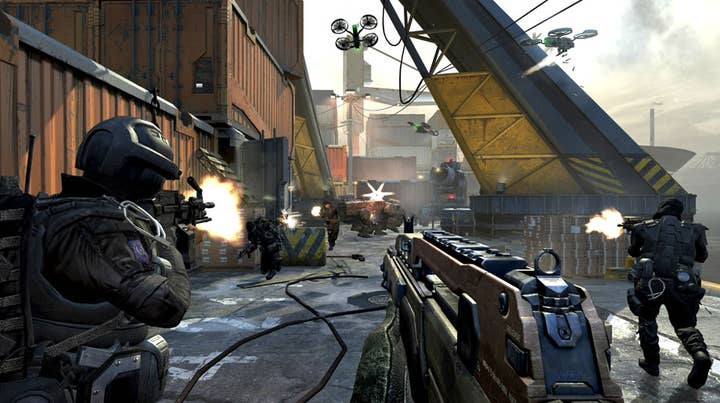Activision may have peaked
2012 was the best of times, but 2013 could be quite turbulent
It was a better than expected quarter that capped off a record year for Activision. The fourth quarter brought in $2.6 billion in revenue, compared to analyst estimates of $2.44 billion. The company came within spitting distance of $5 billion in revenue for the year ($4.987 billion, to be precise), which is amazing for a company that's not manufacturing console hardware. The downside of this performance: Activision is already telling us it won't happen again in 2013, with the company projecting results substantially lower for this year (at $4.175 billion). Will the company see growth again, or was 2012 the highest point it will ever reach?
CEO Bobby Kotick praised the company's performance: "We achieved record fourth quarter and annual results. And in 2012, on a non-GAAP basis, we generated approximately $5 billion in revenues, a 34 per cent operating margin and EPS growth of 27 per cent over the prior year. We increased our operating cash flow by 41 percent." It's extremely impressive; Activision continues to manage its properties well in a horrible retail environment.
Kotick also provided some other info to show Activision's dominance. "In the US and Europe, we were the #1 video game publisher at retail, we're the #1 title overall, the #1 console title and the #1 PC title." Kotick also threw in the following: "We're also the #1 independent Western Digital game publisher and had the #1 subscription-based MMORPG."
"We encounter new threats from unproven business models, and we compete against new category entrants. We aren't immune to unfavorable market dynamics"
Bobby Kotick
Notice the exceptionally careful phrasing here, to conveniently exclude Chinese, Korean and Japanese publishers, as well as Russia's Wargaming.net. And being the #1 subscription-based MMORPG isn't saying much, given that almost every other MMORPG these days is free-to-play. The lily is already pretty damn impressive; there's really no need to add gilding.
The rapid growth of Skylanders was given some special attention. "Skylanders, our newest franchise, which is both toys and video games, has life-to-date sold in excess of $100 million toys and generated revenues of approximately $1 billion. This week, Activision Publishing revealed the third game in the Skylanders franchise for holiday 2013. And while there are new entrants in the category and challenges from slower than expected adoption of the Wii U, we remain enthusiastic about Skylanders' future prospects."
First we had EA's CEO saying the Wii U wasn't a next-generation console, and now Activision's CEO is calling out the Wii U for slow sales. Nintendo doesn't appear to be getting much love from third-party publishers in the West.

Kotick then sounded a cautionary note: "We recognized that 2013 is a transition year, as we enter the ninth year of the current generation of console video game systems. We encounter new threats from unproven business models, and we compete against new category entrants. We aren't immune to unfavorable market dynamics, but we have navigated through the transitions many times before, and we are well prepared to do so again."
If a business model is unproven, how is it a threat exactly? Isn't it a threat if it's doing really well, which in some sense proves that it (or at least that instantiation) works, doesn't it? Perhaps what Kotick is saying is that there are business models (like free-to-play) which are working damnably well, but unfortunately Activision hasn't used those models, so they (to Activision's experience) are unproven. Let's simplify this: If it's working well enough to be a threat, shouldn't Activision at least be experimenting with it?
"For Call of Duty we are planning for the mainline release in Q4 to be down versus 2012"
Dennis Durkin
CFO Dennis Durkin looked ahead to this year's prospects: "Our product lineup is expected to be anchored by 4 of our top franchises: Call of Duty, Skylanders, World of Warcraft and StarCraft. It will also be a year of significant continued investment in several new properties with long-term potential that are not factored into our 2013 financial outlook, including Activision Publishing's new Bungie universe, Call of Duty Online for China and the new Blizzard MMO." That could mean none of those new titles will ship this year. Or perhaps one or more might ship, but Activision isn't sure, and doesn't want to count revenue that may not materialize.
Durkin went on to say: "For the full year 2012, Diablo III contributed more than $0.20 of EPS on a standalone basis. This year, our outlook for Blizzard includes the release of the StarCraft II expansion pack, Heart of the Swarm, in March and one additional title. For Call of Duty, consistent with our past practices, we are planning for the mainline release in Q4 to be down versus 2012."
Activision reached peak sales of Call of Duty two years ago, and expects this year to be lower once again than last year. When you're coming out with a new version of the game every year, it's hard to keep posting record numbers. New consoles might help, but they will probably be too late in the year to matter much even if Activision does have a version of Call of Duty ready for them.
Why won't new consoles matter much for 2013? Let's look at the numbers. Assuming a new console ships in November, it's unlikely to sell more than a couple of million units by the end of the year; let's say it's an amazing success and sells 5 million. Selling a game to half of those buyers would be incredible; that would be 2.5 million units. When a Call of Duty title can sell nearly ten times that amount, you can see why it's not reasonable to expect new consoles to help Activision's numbers significantly. Sure, they might, if absolutely everything goes well. But companies like to be a little conservative on their projections to give themselves a good chance to beat the numbers. Investors like it when companies beat their numbers.

Blizzard CEO Mike Morhaime then gave some color on his products: "World of Warcraft added more than 9.6 million players, down slightly from the previous quarter. The majority of the decline came from China, while subscribership in the West was relatively more stable." Later, Morhaime added: "With respect to China, in spite of the decline in subscribership, it is important to note that the engagement levels of the core items did increase with the launch of the expansions and I think that, that suggests increased engagement by our core players."
So WoW subscriber numbers are shrinking, but the remaining players are more engaged. To some extent, this is acceptable if overall revenue can remain constant or even rise if virtual goods sales are high enough among the remaining players, and they stay subscribed longer. At some point, though, if subscriber numbers keep falling overall revenue will drop. The key information here is that World of Warcraft has apparently already burned through the boost it got from Mists of Pandaria, and is back to losing subscribers (at least in China), but the rate of erosion isn't too alarming. Yet.
One of the analysts asked whether development costs will rise for titles destined for next-gen consoles. Kotick was straightforward: "This is my 22nd year doing this, and in every single console transition, we've seen an increase in development costs." Margin improvement for next-gen titles is going to depend on selling more DLC, not on reducing development costs. Until next-gen consoles are in tens of millions of households, revenue from next-gen titles will be lower than current-gen titles - and development costs will be higher. That's not a good combination.
"This is my 22nd year doing this, and in every single console transition, we've seen an increase in development costs"
Bobby Kotick
Activision's stock has mostly hovered between $10.50 and $12.50 for the past several years, though after yesterday's report it's shot up to $13.41, a gain of over 11 per cent. Wedbush analyst Michael Pachter has a long-term target of $19 for Activision stock, which is above the stock's high point five years ago. It's difficult to see how the stock gets there unless gaming stocks in general become more well-received by investors. Perhaps if new consoles launch strongly, and Bungie's new game is a smash hit, and everything goes well...
Meanwhile the general message of this earnings report is that Activision is being careful with major strategy moves. Activision is still merely dabbling in mobile games, and doesn't expect them to be a significant contribution to the company in the coming year. So far, the company is resisting moving World of Warcraft over to a free-to-play model; that may be wise given that such a changeover doesn't always work well. Where's the chance for major growth? Bungie's new title, the new Blizzard MMO, and Call of Duty in China, that's where. There are questions about all of them, of course. Will Bungie's title pull in a significantly different audience than Call of Duty, or will it cannibalize that game's players? Will Blizzard's MMO merely move players over from World of Warcraft, or will it attract a significant new audience? Will Chinese players really turn out in big numbers for Call of Duty Online?
Looming over all of these questions is the long-term viability of the console market, and whether the new consoles coming from Sony and Microsoft will revive the console game business to the heights of 2008. Activision is in great shape right now, with billions of dollars in cash and four great brands that generate amazing sales. Of those four brands, three are getting pretty long in the tooth; can they perform at their current levels, or will they continue to decline slowly? The success of new consoles may be critical to Activision's future. The company may choose to diversify with acquisitions, or it may keep the cash tucked away for a rainy day or a larger strategic acqusition.
Activision's had a great 2012, and 2013 looks pretty good. The company's longer-term picture depends mostly on how the console market continues, and how the MMOG market evolves along with Activision's products in that area. Mobile doesn't appear to have big potential for Activision yet. The other potential big mover for Activision is a major acquisition, like, say, Take-Two. Activision has enough cash to make such a purchase, or some other large strategic move. We'll have to keep watching to see how that strategy game might play out.
For now, at least, Activision expects to have sales lower than last year's level. Growth is only going to happen in 2014 and beyond if Activision's new projects can do well, and new consoles do well, and existing brands don't fade too quickly. When you're at the top of the mountain, climbing higher is difficult. Perhaps the Skylands offer a path higher...

